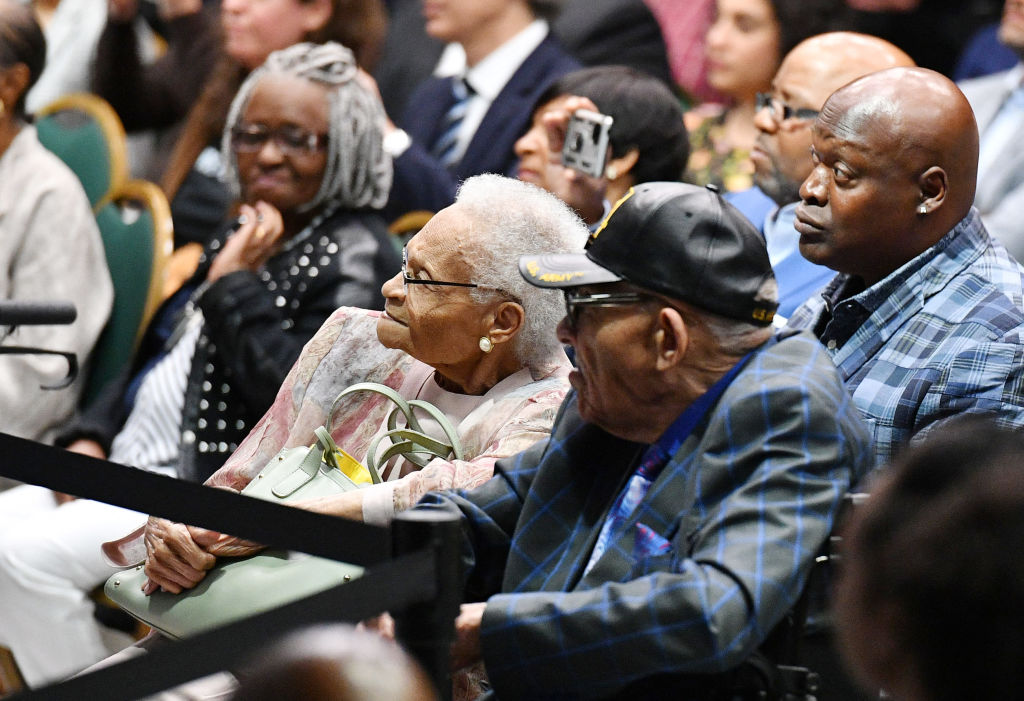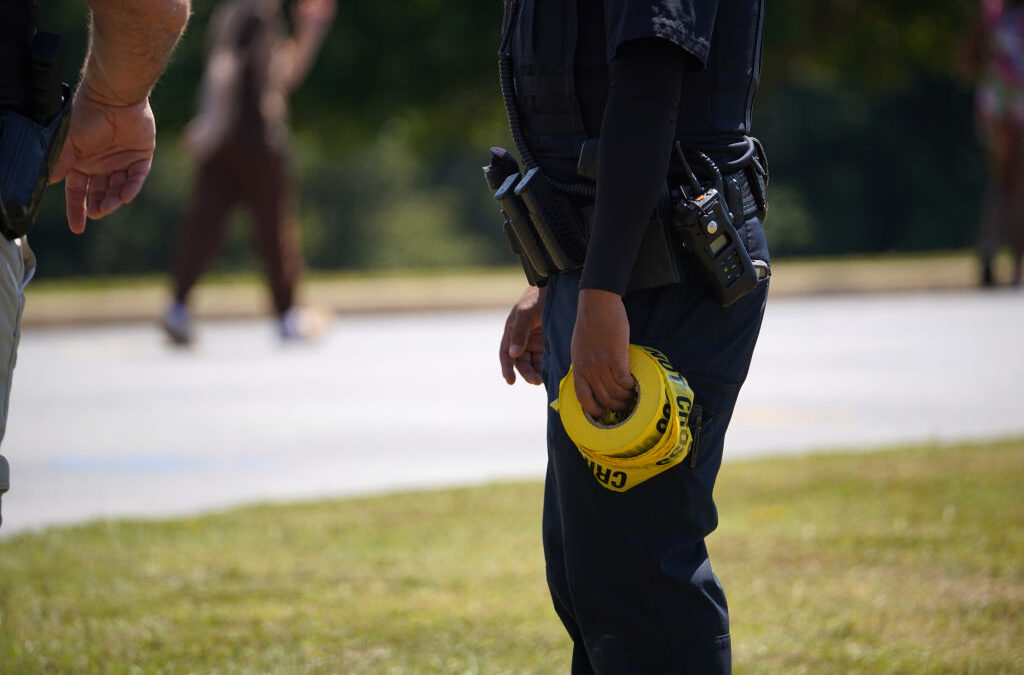Source: MANDEL NGAN / Getty
A Painful Blow To Historical Justice
In a heart-wrenching blow to the remaining survivors of one of America’s most horrific race massacres, the Oklahoma Supreme Court dismissed a lawsuit filed by survivors of the 1921 Tulsa Race Massacre.
Plaintiffs Viola Ford Fletcher and Lessie Benningfield Randle, both over 100 years old, sought reparations under the city’s public nuisance statute, aiming to address the enduring social and economic inequities stemming from the massacre.
They did this during The 1921 Tulsa Race Massacre. Over 500 White men and boys were deputized and armed. They shot and killed numerous Black people, destroying 35 blocks of Black Wallstreet https://t.co/nJ4y17j0o0
— Allison Wiltz Psy.M. (@queenie4rmnola) June 11, 2024
Survivors’ Heartfelt Plea
At 110 Viola Fletcher is the oldest living Tulsa Race Massacre survivor
She’s lived through 44% of US history, survived white supremacy terror, & suffered 50 years of Jim Crow—& after waiting 103 years for reparations—an all white Oklahoma Supreme Court said NO
What a disgrace.
— Qasim Rashid, Esq. (@QasimRashid) June 14, 2024
Their attorneys passionately contended that these women deserved their day in court. “The destruction of forty-square blocks of property on the night of May 31, 1921, through murder and arson clearly meets the definition of a public nuisance under Oklahoma law,” the lawyers argued.
Court’s Cold Response
Despite the compelling arguments, the Oklahoma Supreme Court sided with a lower court’s ruling. According to News One, they stated that “simply being connected to a historical event does not provide a person with unlimited rights to seek compensation.”
On this day in 1921, The Tulsa Race Massacre happened in the affluent black community of Greenwood in Tulsa (Black Wall Street)
White supremacists killed more than 300 African Americans and looted & burned to ground homes & businesses.
History of Tulsa before the riot
A THREAD pic.twitter.com/tpqCM4S818
— AFRICAN & BLACK HISTORY (@AfricanArchives) May 31, 2024
The court acknowledged the legitimacy of the grievance regarding the social and economic inequities created by the Tulsa Race Massacre. Yet it claimed the law does not permit extending the public nuisance doctrine beyond legislative authorization.
Tulsa’s Profiteering: A Grim Irony
Source: ANDREW CABALLERO-REYNOLDS / Getty
Adding to the survivors’ pain is the irony of Tulsa’s profiteering from the massacre.
The lawsuit highlighted how Tulsa promoted the massacre site as a tourist attraction, gaining “unjust enrichment” without returning benefits to the community.
This exploitation, while denying justice to the very people who suffered, underscores a deep-rooted hypocrisy in how historical injustices are managed.
A Political Tangle: The Court’s Stance
The court’s dismissal is seen by many as a politically charged decision. Attorneys for Fletcher and Randle argued that the massacre’s destruction clearly constituted a public nuisance deserving of legal redress.
However, the court viewed the issue as a “political” question beyond its scope. This legal stance ignores the profound human suffering and historical injustice. It dehumanizes a deeply personal and social issue to a mere political debate.
Historical Denial Of Claims: A Pattern of Injustice
The denial of justice is not new. Shortly after the massacre, insurance companies denied many claims filed by Black business owners for tens of millions of dollars in property damage.
This historical pattern of denying Black victims their due compensation continues to haunt the survivors and their descendants. The ones that built this country. It’s not up for debate. These policies of disenfranchisement and incentivizing racist violence extend the racial wealth gap that robs generations of Black families across the U.S.
Next Steps: The Fight for Justice Continues
The fight is far from over. Attorneys for Fletcher and Randle plan to file a petition for the Oklahoma Supreme Court to rehear the case.
They also called on the U.S. Department of Justice to investigate the massacre under the Emmett Till Unsolved Civil Rights Crime Act of 2007.
The legal team for the survivors of the 1921 Tulsa Race Massacre said they will “file a petition for rehearing with the Oklahoma Supreme Court asking the Court to reconsider its decision” pic.twitter.com/kB30UY4F96
— philip lewis (@Phil_Lewis_) June 12, 2024
The attorneys remain steadfast, believing the plaintiffs are entitled to a trial. They urged federal intervention to correct this grave historical wrong.
Related Legislation: A Barrier To Justice
Adding to the complexities, in 2021, Oklahoma Governor Kevin Stitt signed a bill prohibiting teachings that include Critical Race Theory in K-12 schools.
In 2022, Stitt called for an investigation into Tulsa Public Schools for allegedly violating the state’s anti-CRT law. These legislative actions further complicate the fight for racial justice in Oklahoma, reinforcing systemic barriers.
Voices of Outrage & Hope
The dismissal of the lawsuit has sparked outrage and sorrow among those who continue to fight for justice.
HAVING AN ATTENDANCE OF ONE MILLION+ BLACK AMERICANS BE PRESENT AT THE REPARATIONS RALLY/JUNETEENTH CELEBRATION IS THE PROPER RESPONSE TO THE TULSA, OKLAHOMA SUPREME COURT DECISION DENYING COMPENSATORY JUSTICE TO THE SURVIVING VICTIMS OF THE TULSA RACE MASSACRE. #SeeYouThere pic.twitter.com/VuXcQ8XGmy
— Blackity Black (@FBAReparations) June 14, 2024
The dismissal of the lawsuit by the Oklahoma Supreme Court is a stark reminder of the ongoing struggle for racial justice in America.
As the survivors and their supporters continue to fight for recognition and reparations, their perseverance serves as a powerful call to action.
The journey to justice for the Tulsa Race Massacre survivors is fraught with legal and political hurdles, but their resilience remains a beacon of hope for future generations.
Source: MANDEL NGAN / Getty
A Painful Blow To Historical Justice
In a heart-wrenching blow to the remaining survivors of one of America’s most horrific race massacres, the Oklahoma Supreme Court dismissed a lawsuit filed by survivors of the 1921 Tulsa Race Massacre.
Plaintiffs Viola Ford Fletcher and Lessie Benningfield Randle, both over 100 years old, sought reparations under the city’s public nuisance statute, aiming to address the enduring social and economic inequities stemming from the massacre.
They did this during The 1921 Tulsa Race Massacre. Over 500 White men and boys were deputized and armed. They shot and killed numerous Black people, destroying 35 blocks of Black Wallstreet https://t.co/nJ4y17j0o0
— Allison Wiltz Psy.M. (@queenie4rmnola) June 11, 2024
Survivors’ Heartfelt Plea
At 110 Viola Fletcher is the oldest living Tulsa Race Massacre survivor
She’s lived through 44% of US history, survived white supremacy terror, & suffered 50 years of Jim Crow—& after waiting 103 years for reparations—an all white Oklahoma Supreme Court said NO
What a disgrace.
— Qasim Rashid, Esq. (@QasimRashid) June 14, 2024
Their attorneys passionately contended that these women deserved their day in court. “The destruction of forty-square blocks of property on the night of May 31, 1921, through murder and arson clearly meets the definition of a public nuisance under Oklahoma law,” the lawyers argued.
Court’s Cold Response
Despite the compelling arguments, the Oklahoma Supreme Court sided with a lower court’s ruling. According to News One, they stated that “simply being connected to a historical event does not provide a person with unlimited rights to seek compensation.”
On this day in 1921, The Tulsa Race Massacre happened in the affluent black community of Greenwood in Tulsa (Black Wall Street)
White supremacists killed more than 300 African Americans and looted & burned to ground homes & businesses.
History of Tulsa before the riot
A THREAD pic.twitter.com/tpqCM4S818
— AFRICAN & BLACK HISTORY (@AfricanArchives) May 31, 2024
The court acknowledged the legitimacy of the grievance regarding the social and economic inequities created by the Tulsa Race Massacre. Yet it claimed the law does not permit extending the public nuisance doctrine beyond legislative authorization.
Tulsa’s Profiteering: A Grim Irony
Source: ANDREW CABALLERO-REYNOLDS / Getty
Adding to the survivors’ pain is the irony of Tulsa’s profiteering from the massacre.
The lawsuit highlighted how Tulsa promoted the massacre site as a tourist attraction, gaining “unjust enrichment” without returning benefits to the community.
This exploitation, while denying justice to the very people who suffered, underscores a deep-rooted hypocrisy in how historical injustices are managed.
A Political Tangle: The Court’s Stance
The court’s dismissal is seen by many as a politically charged decision. Attorneys for Fletcher and Randle argued that the massacre’s destruction clearly constituted a public nuisance deserving of legal redress.
However, the court viewed the issue as a “political” question beyond its scope. This legal stance ignores the profound human suffering and historical injustice. It dehumanizes a deeply personal and social issue to a mere political debate.
Historical Denial Of Claims: A Pattern of Injustice
The denial of justice is not new. Shortly after the massacre, insurance companies denied many claims filed by Black business owners for tens of millions of dollars in property damage.
This historical pattern of denying Black victims their due compensation continues to haunt the survivors and their descendants. The ones that built this country. It’s not up for debate. These policies of disenfranchisement and incentivizing racist violence extend the racial wealth gap that robs generations of Black families across the U.S.
Next Steps: The Fight for Justice Continues
The fight is far from over. Attorneys for Fletcher and Randle plan to file a petition for the Oklahoma Supreme Court to rehear the case.
They also called on the U.S. Department of Justice to investigate the massacre under the Emmett Till Unsolved Civil Rights Crime Act of 2007.
The legal team for the survivors of the 1921 Tulsa Race Massacre said they will “file a petition for rehearing with the Oklahoma Supreme Court asking the Court to reconsider its decision” pic.twitter.com/kB30UY4F96
— philip lewis (@Phil_Lewis_) June 12, 2024
The attorneys remain steadfast, believing the plaintiffs are entitled to a trial. They urged federal intervention to correct this grave historical wrong.
Related Legislation: A Barrier To Justice
Adding to the complexities, in 2021, Oklahoma Governor Kevin Stitt signed a bill prohibiting teachings that include Critical Race Theory in K-12 schools.
In 2022, Stitt called for an investigation into Tulsa Public Schools for allegedly violating the state’s anti-CRT law. These legislative actions further complicate the fight for racial justice in Oklahoma, reinforcing systemic barriers.
Voices of Outrage & Hope
The dismissal of the lawsuit has sparked outrage and sorrow among those who continue to fight for justice.
HAVING AN ATTENDANCE OF ONE MILLION+ BLACK AMERICANS BE PRESENT AT THE REPARATIONS RALLY/JUNETEENTH CELEBRATION IS THE PROPER RESPONSE TO THE TULSA, OKLAHOMA SUPREME COURT DECISION DENYING COMPENSATORY JUSTICE TO THE SURVIVING VICTIMS OF THE TULSA RACE MASSACRE. #SeeYouThere pic.twitter.com/VuXcQ8XGmy
— Blackity Black (@FBAReparations) June 14, 2024
The dismissal of the lawsuit by the Oklahoma Supreme Court is a stark reminder of the ongoing struggle for racial justice in America.
As the survivors and their supporters continue to fight for recognition and reparations, their perseverance serves as a powerful call to action.
The journey to justice for the Tulsa Race Massacre survivors is fraught with legal and political hurdles, but their resilience remains a beacon of hope for future generations.
Source: MANDEL NGAN / Getty
A Painful Blow To Historical Justice
In a heart-wrenching blow to the remaining survivors of one of America’s most horrific race massacres, the Oklahoma Supreme Court dismissed a lawsuit filed by survivors of the 1921 Tulsa Race Massacre.
Plaintiffs Viola Ford Fletcher and Lessie Benningfield Randle, both over 100 years old, sought reparations under the city’s public nuisance statute, aiming to address the enduring social and economic inequities stemming from the massacre.
Survivors’ Heartfelt Plea
Their attorneys passionately contended that these women deserved their day in court. “The destruction of forty-square blocks of property on the night of May 31, 1921, through murder and arson clearly meets the definition of a public nuisance under Oklahoma law,” the lawyers argued.
Court’s Cold Response
Despite the compelling arguments, the Oklahoma Supreme Court sided with a lower court’s ruling. According to News One, they stated that “simply being connected to a historical event does not provide a person with unlimited rights to seek compensation.”
The court acknowledged the legitimacy of the grievance regarding the social and economic inequities created by the Tulsa Race Massacre. Yet it claimed the law does not permit extending the public nuisance doctrine beyond legislative authorization.
Tulsa’s Profiteering: A Grim Irony
Source: ANDREW CABALLERO-REYNOLDS / Getty
Adding to the survivors’ pain is the irony of Tulsa’s profiteering from the massacre.
The lawsuit highlighted how Tulsa promoted the massacre site as a tourist attraction, gaining “unjust enrichment” without returning benefits to the community.
This exploitation, while denying justice to the very people who suffered, underscores a deep-rooted hypocrisy in how historical injustices are managed.
A Political Tangle: The Court’s Stance
The court’s dismissal is seen by many as a politically charged decision. Attorneys for Fletcher and Randle argued that the massacre’s destruction clearly constituted a public nuisance deserving of legal redress.
However, the court viewed the issue as a “political” question beyond its scope. This legal stance ignores the profound human suffering and historical injustice. It dehumanizes a deeply personal and social issue to a mere political debate.
Historical Denial Of Claims: A Pattern of Injustice
The denial of justice is not new. Shortly after the massacre, insurance companies denied many claims filed by Black business owners for tens of millions of dollars in property damage.
This historical pattern of denying Black victims their due compensation continues to haunt the survivors and their descendants. The ones that built this country. It’s not up for debate. These policies of disenfranchisement and incentivizing racist violence extend the racial wealth gap that robs generations of Black families across the U.S.
Next Steps: The Fight for Justice Continues
The fight is far from over. Attorneys for Fletcher and Randle plan to file a petition for the Oklahoma Supreme Court to rehear the case.
They also called on the U.S. Department of Justice to investigate the massacre under the Emmett Till Unsolved Civil Rights Crime Act of 2007.
The attorneys remain steadfast, believing the plaintiffs are entitled to a trial. They urged federal intervention to correct this grave historical wrong.
Related Legislation: A Barrier To Justice
Adding to the complexities, in 2021, Oklahoma Governor Kevin Stitt signed a bill prohibiting teachings that include Critical Race Theory in K-12 schools.
In 2022, Stitt called for an investigation into Tulsa Public Schools for allegedly violating the state’s anti-CRT law. These legislative actions further complicate the fight for racial justice in Oklahoma, reinforcing systemic barriers.
Voices of Outrage & Hope
The dismissal of the lawsuit has sparked outrage and sorrow among those who continue to fight for justice.
The dismissal of the lawsuit by the Oklahoma Supreme Court is a stark reminder of the ongoing struggle for racial justice in America.
As the survivors and their supporters continue to fight for recognition and reparations, their perseverance serves as a powerful call to action.
The journey to justice for the Tulsa Race Massacre survivors is fraught with legal and political hurdles, but their resilience remains a beacon of hope for future generations.
Comments
Bossip Comment Policy
Please read our Comment Policy before commenting.
A Painful Blow To Historical Justice In a heart-wrenching blow to the remaining survivors of one of America’s most horrific race massacres, the Oklahoma Supreme Court dismissed a lawsuit filed by survivors of the 1921 Tulsa Race Massacre. Plaintiffs Viola Ford Fletcher and Lessie Benningfield Randle, both over 100 years old, sought reparations under the Bossip





